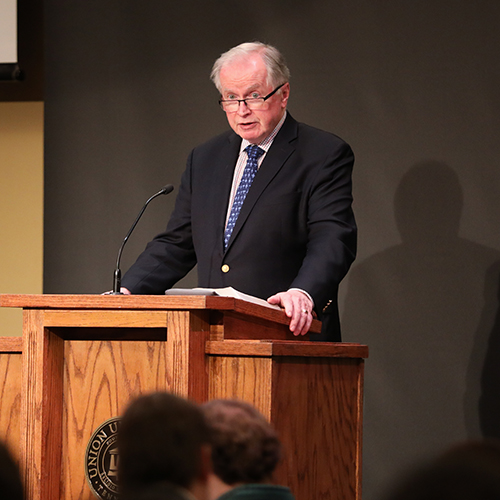JACKSON, Tenn. — March 10, 2020 — Based on Revelation chapters 12-14, the underlying cause of the difficulties and suffering of the church is nothing less than the rage of Satan, said Don Carson, emeritus professor of New Testament at Trinity Evangelical Divinity School, during the Ryan Center for Biblical Studies’ 2020 Spring Bible Conference.
Pastors from eight states in the Mid-South attended the March 6-7 conference in the Carl Grant Events Center. The topic of the conference was “The Defeat of the Unholy Triumvirate,” and Carson taught from these passages in Revelation during three plenary sessions.
“Dr. Carson is a great model of combining academic rigor and confessional faithfulness and commitment to the Word of God,” said Ray Van Neste, dean for the School of Theology and Missions and professor of biblical studies. Van Neste studied under Carson as a graduate student at Trinity.
In his first plenary session, Carson broke up the text of Revelation 12 into three parts: First, the author of the book, John, outlines the occasion for this Satanic rage. In John’s vision, the scene opens with a great and wondrous sign: a woman, whom Carson said represents the people of God, is about to give birth. An enormous red dragon, which Scripture says is the devil, is waiting to eat the child as soon as he is born.
The child — a son — is born, who will rule all nations with an iron scepter. This child represents Jesus, Carson said. Instead of being eaten by the dragon, the child is snatched up to God and his throne, moving from Christ’s birth to his ascension, he said. The woman flees to the wilderness to a place prepared for her by God.
“This woman, the people of God, are sent off into the wilderness where they will be struggling and facing difficulty, but also protected by God, for a set period of time of struggle until there’s finally release,” Carson said.
Carson said he thinks that here and in the whole book of Revelation, the time period depicted is to be understood as the period before the second coming of Christ.
Next in John’s vision, war breaks out in heaven between Michael and his angels and the dragon and his angels, and the dragon is hurled down to earth and loses his place in heaven.
Second, Carson continued, John identifies the reasons for this Satanic rage: Satan’s time is short, his fear is restricted and his success is limited. In John’s vision, the cast-down dragon pursues the woman on earth. Satan is not so angry with God’s people because he knows he is going to win, Carson explained, but because he knows he has already lost.
“As cultural things darken in the West, this is not the time for self-pity or for anger or for measuring our success by physical triumphs, but to understand the real rage against the church is bound up with Satan himself,” Carson said.
Last, Carson said John specifies how Christians overcome this Satanic rage: they triumphed over him by the blood of the Lamb, on the word of their testimony — that is, preaching the gospel — and by their simple willingness to die.
In conclusion, Carson noted two important applications. First, Christians must analyze their situation biblically and theologically, not simply sociologically and psychologically. They should think in terms of what the devil is doing, what God is doing and where they are in redemptive history, he said.
“Second, we must recognize and use our weapons, the only effective weapons we have, all that are based on Christ’s atoning death — the power of the Spirit who was poured out in consequence of Christ’s death and resurrection; all the authority based on proclaiming the word of the gospel, faithfully maintained, joyfully proclaimed whether it’s accepted or not; and all the courage and integrity that emerge because death cannot frighten those who follow the Prince of Life,” Carson said.
Carson spoke in two additional plenary sessions on Saturday. Parallel sessions on Revelation led by School of Theology and Missions faculty Hal Poe, Mark Catlin, Brad Green and Jacob Shatzer were also offered.

